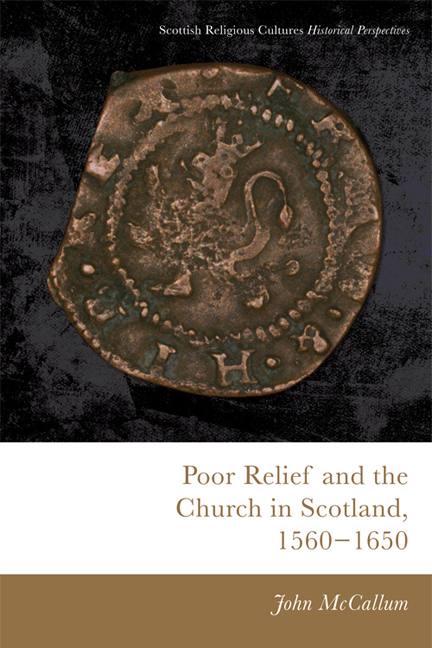Book contents
- Frontmatter
- Contents
- List of Tables
- Acknowledgements
- Conventions
- Abbreviations
- Map of Key Locations Mentioned
- Introduction
- 1 Ideas, Attitudes and Ambitions
- Part I The Development of Kirk Session Poor Relief
- Part II The Nature of Kirk Session Poor Relief
- Conclusion
- Appendix Equivalent Values from Wages and Prices
- Bibliography
- Index
Conclusion
Published online by Cambridge University Press: 14 September 2018
- Frontmatter
- Contents
- List of Tables
- Acknowledgements
- Conventions
- Abbreviations
- Map of Key Locations Mentioned
- Introduction
- 1 Ideas, Attitudes and Ambitions
- Part I The Development of Kirk Session Poor Relief
- Part II The Nature of Kirk Session Poor Relief
- Conclusion
- Appendix Equivalent Values from Wages and Prices
- Bibliography
- Index
Summary
The problem of poverty was not a new one after 1560, and the desire to improve the treatment of the deserving poor (and to exclude and control the undeserving) was not an invention of the Protestant Reformation, nor of the sixteenth century. The Scottish Protestant reformers certainly wanted to improve welfare provision. But far more important than their rhetorical statements on the issue, or those of their opponents, were the institutional mechanisms they created as part of their new church. Through the kirk session, the Reformation of 1559–60 created the possibility for a localised and routine system of poor relief that was entirely unprecedented in Scotland. In the following decades, local ministers, elders and deacons began to put that possibility into practice.
This book has introduced the key features of kirk session poor relief up until the middle of the seventeenth century. It has argued that, in contrast to the negative assumptions and statements made when mentioned in passing, and especially the narrative of the failed implementation of the Poor Law, the system was a generally strong one. Substantial and regular fundraising took place, drawing carefully on the available resources to support relief, on an ongoing and durable basis. While most funds were raised without legal compulsion, fundraising mechanisms sometimes blurred any line between voluntary and compulsory contribution. The system was effectively managed and administered on a localised basis by parish clergy and lay leaders, with local variations on specific issues and problems (and the level of detail recorded in the session minutes), but also a broad common approach to the core principles of the system. They were dedicated and sometimes innovative in operating poor relief, and those problems that did occur involved individual failings rather than any institutional lack of enthusiasm. It was also resilient: kirk session relief weathered very severe pressures surprisingly well, and achieved a degree of stability and continuity in relief at such times, while sometimes responding swiftly to urgent cases of distress elsewhere.
At parish level, a wide range of poor people received varying levels and frequency of support from the sessions, with some flexibility about the form and amount of relief granted to those deemed needy enough – and moral enough – to benefit.
- Type
- Chapter
- Information
- Poor Relief and the Church in Scotland, 1560–1650 , pp. 236 - 241Publisher: Edinburgh University PressPrint publication year: 2017



